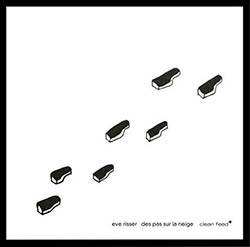
Paris-based Risser offers three pieces for solo prepared and enhanced piano in an adventurous set that deals in sustained, thoughtful music though its success wears out a bit over the longer haul.
The first two tracks clock in at about 15 and 13 minutes respectively and are fine examples of both concision and expansiveness. On the title track, she combines several attacks into a multi-layered approach including preparations, string-strumming and bowing, piano-frame percussion and traditional keyboard, but manages to keep the music uncluttered, focused and subtly forward-moving, despite the lack of clear rhythms or melodies. Risser also creates wonderful depth between the more up front keyboard tones, the glimmers of stroked strings and the warm, wooden clicks. The tonality carries vague jazz-ish hints (think Marilyn Crispell) but also nods to players like John Tilbury, allowing the sounds to occupy a very unique, non-idiomatic area. "des pas sur la ville" also begins inside the piano, more delicately with a kind of gamelan feel, but with the addition of an ebow (I think) used on the strings, imparting a soft drone to the affair. A dense web of strummings and taps is introduced, once again thickening the mix without becoming cloying; indeed, the music is quite transparent, though more abuzz and vibrating than subtly flowing as in the first piece.
It's on the 36 minute plus "la neige sur la ville" that things begin to unravel slightly. The work begins very enticingly, with what sounds like multiple ebows in play, buttressing some fine rustling and, soon, individually plucked strings and struck keyboard notes, everything floating along quite well. As accommodating as it is, it perhaps overstays its welcome, hovering somewhere between true stasis and an itch to move outward. The music begins to meander somewhat, settling neither here nor there, getting into a quasi-repetitious mode at times yet feeling a bit flaccid. It turns rougher, more percussive (including items rolling around the frame) which, in itself, is not unwelcome given the relatively gentle flow thus far, and it's not altogether unsuccessful, just a good bit less so than the earlier tracks, feeling less focused and necessary, more of an obligation, an exposition of attacks and techniques.
But the first two pieces and a decent part of the third make for an enjoyable foray into Risser's conception, a very strong and worthwhile one.
Comments and Feedback:
|



